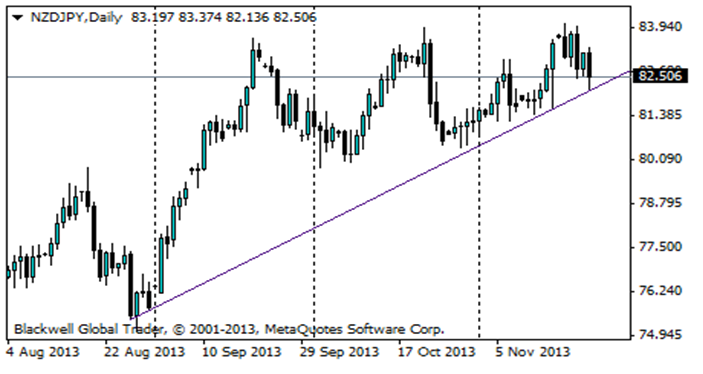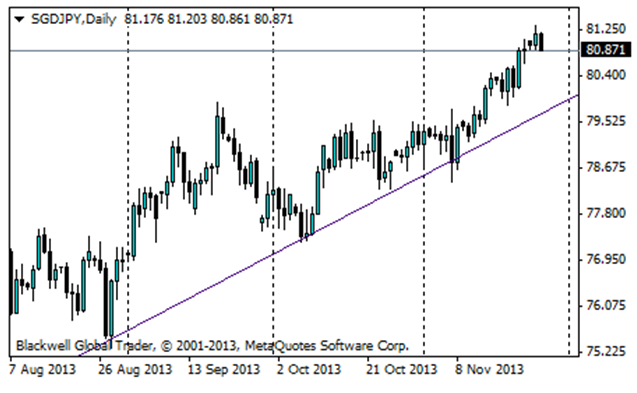Since Abenomics was introduced, the JPY has plummeted in value. The aggressive monetary policy was supposed to achieve two goals:
1) To counter deflation
2) To bring back export competitiveness.
So far, neither has been achieved.
According to the BoJ, more aggressive stimulus is needed. Meaning, the JPY is only going to carry on getting weaker. The Yen has already decreased by on average 20% against their main counterparts.
Therefore, I am trading against the Japan currency, with the below providing myself with reasons for further JPY weakness.
Continued deflation threats:
Japan has had a deflation issue for over a decade. Abenomics was supposed to cure this. It was hoped that within two years of monetary stimulus being pumped into the Japan economy, an annual 2% inflation rate would be consistently achieved.
However, the recent BoJ minutes stated that more monetary easing is needed in 2014, to achieve the inflation target. It has been reported that at least 5 out of 9 BoJ policy members feel that the inflation target is currently unachievable. The next inflation reading is on Thursday 28th November. Regardless, the apparent threat of further easing is a clear future indicator of the JPY further weakening.
Large trade deficit:
Japan has recorded atrade deficit for 16 consecutive months. Devaluing the JPY was supposed to encourage export competitiveness, but nobody realised that the Fukushima natural disaster would cause a large increase in imports.
Since Fukushima, Japan has been forced to shut down all of their 50 nuclear power plants. Previously, nuclear energy supplied Japan with one third of all their power. Currently, Japan imports at least 84% of their energy requirements.
There is still no indication on when the nuclear power plants are going to be reopened. Until this happens, a large trade deficit every month will weaken the JPY.
The currency pairs I would look out for:
Although, the most liquid currency pair involving the Japanese currency maybe the USD/JPY, I actually find the most attractive opportunities to be with minor currency pairs.
The USD/JPY has increased by 27% in the past year, but I remain unconvinced regarding the US economic recovery. I remain vigilant towards a sharp pull back at any given moment.
True, the GBP/JPY and the EUR/JPY are attractive alternatives. However, I very much like the NZD/JPY, AUD/JPY, CHF/JPY and the SGD/JPY. These may not be the most liquid currency pairs on a trading platform, but I feel their incline is more gradual. I find that they are easier to predict and less volatile currency pairs. Meaning they are less prone to extreme changes in direction.
I will also be less susceptible to a piece of breaking news rapidly shifting the market, especially with a high quantity of economic news coming out from the United States and European Union at present. NZD/JPY" title="NZD/JPY" height="374" width="703" />
NZD/JPY" title="NZD/JPY" height="374" width="703" /> SGD/JPY" title="SGD/JPY" height="374" width="703" />
SGD/JPY" title="SGD/JPY" height="374" width="703" />
To conclude, since Abenomics was introduced, it is obvious to see that the JPY has deteriorated rapidly in value. There are also clear indications from the BoJ that further stimulus is needed, which will provide me with future long opportunities.
I also feel that the trade deficit is not likely to go away anytime soon, which assures me that we have not seen the end of the JPY weakening. It’s true that achieving inflation targets is their main goal right now, but this deficit can’t be ignored forever.
It’s not that I don’t think Abenomics is a good idea, if it works in the long term, the Japanese economy will become more prosperous in the future. However right now, the JPY will continue to weaken and I will trade against the JPY.
- English (UK)
- English (India)
- English (Canada)
- English (Australia)
- English (South Africa)
- English (Philippines)
- English (Nigeria)
- Deutsch
- Español (España)
- Español (México)
- Français
- Italiano
- Nederlands
- Português (Portugal)
- Polski
- Português (Brasil)
- Русский
- Türkçe
- العربية
- Ελληνικά
- Svenska
- Suomi
- עברית
- 日本語
- 한국어
- 简体中文
- 繁體中文
- Bahasa Indonesia
- Bahasa Melayu
- ไทย
- Tiếng Việt
- हिंदी
Why I Am Trading Against The JPY
Published 11/28/2013, 05:25 AM
Why I Am Trading Against The JPY
Latest comments
Loading next article…
Install Our App
Risk Disclosure: Trading in financial instruments and/or cryptocurrencies involves high risks including the risk of losing some, or all, of your investment amount, and may not be suitable for all investors. Prices of cryptocurrencies are extremely volatile and may be affected by external factors such as financial, regulatory or political events. Trading on margin increases the financial risks.
Before deciding to trade in financial instrument or cryptocurrencies you should be fully informed of the risks and costs associated with trading the financial markets, carefully consider your investment objectives, level of experience, and risk appetite, and seek professional advice where needed.
Fusion Media would like to remind you that the data contained in this website is not necessarily real-time nor accurate. The data and prices on the website are not necessarily provided by any market or exchange, but may be provided by market makers, and so prices may not be accurate and may differ from the actual price at any given market, meaning prices are indicative and not appropriate for trading purposes. Fusion Media and any provider of the data contained in this website will not accept liability for any loss or damage as a result of your trading, or your reliance on the information contained within this website.
It is prohibited to use, store, reproduce, display, modify, transmit or distribute the data contained in this website without the explicit prior written permission of Fusion Media and/or the data provider. All intellectual property rights are reserved by the providers and/or the exchange providing the data contained in this website.
Fusion Media may be compensated by the advertisers that appear on the website, based on your interaction with the advertisements or advertisers.
Before deciding to trade in financial instrument or cryptocurrencies you should be fully informed of the risks and costs associated with trading the financial markets, carefully consider your investment objectives, level of experience, and risk appetite, and seek professional advice where needed.
Fusion Media would like to remind you that the data contained in this website is not necessarily real-time nor accurate. The data and prices on the website are not necessarily provided by any market or exchange, but may be provided by market makers, and so prices may not be accurate and may differ from the actual price at any given market, meaning prices are indicative and not appropriate for trading purposes. Fusion Media and any provider of the data contained in this website will not accept liability for any loss or damage as a result of your trading, or your reliance on the information contained within this website.
It is prohibited to use, store, reproduce, display, modify, transmit or distribute the data contained in this website without the explicit prior written permission of Fusion Media and/or the data provider. All intellectual property rights are reserved by the providers and/or the exchange providing the data contained in this website.
Fusion Media may be compensated by the advertisers that appear on the website, based on your interaction with the advertisements or advertisers.
© 2007-2025 - Fusion Media Limited. All Rights Reserved.
